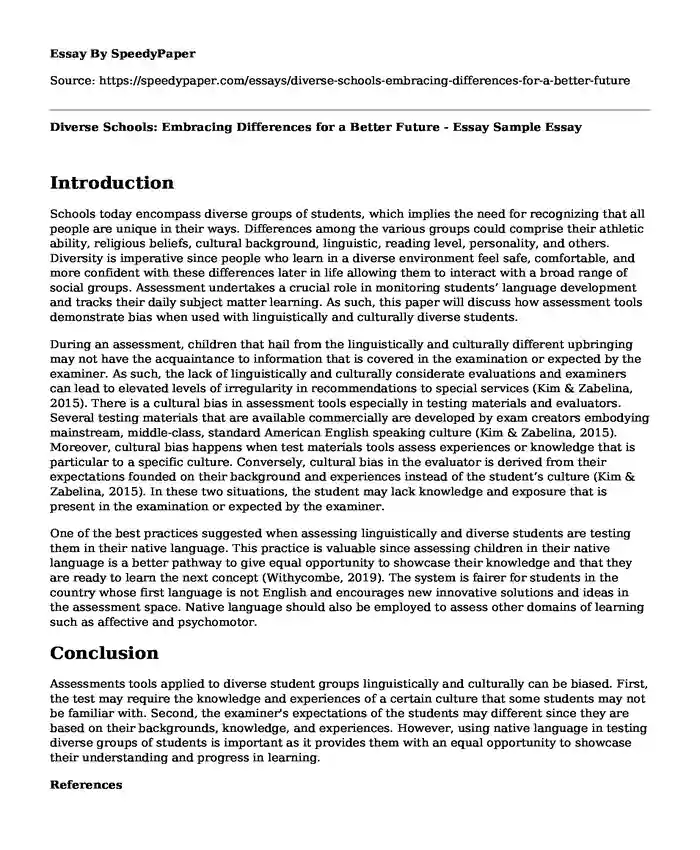
| Type of paper: | Essay |
| Categories: | School |
| Pages: | 2 |
| Wordcount: | 508 words |
Introduction
Schools today encompass diverse groups of students, which implies the need for recognizing that all people are unique in their ways. Differences among the various groups could comprise their athletic ability, religious beliefs, cultural background, linguistic, reading level, personality, and others. Diversity is imperative since people who learn in a diverse environment feel safe, comfortable, and more confident with these differences later in life allowing them to interact with a broad range of social groups. Assessment undertakes a crucial role in monitoring students’ language development and tracks their daily subject matter learning. As such, this paper will discuss how assessment tools demonstrate bias when used with linguistically and culturally diverse students.
During an assessment, children that hail from the linguistically and culturally different upbringing may not have the acquaintance to information that is covered in the examination or expected by the examiner. As such, the lack of linguistically and culturally considerate evaluations and examiners can lead to elevated levels of irregularity in recommendations to special services (Kim & Zabelina, 2015). There is a cultural bias in assessment tools especially in testing materials and evaluators. Several testing materials that are available commercially are developed by exam creators embodying mainstream, middle-class, standard American English speaking culture (Kim & Zabelina, 2015). Moreover, cultural bias happens when test materials tools assess experiences or knowledge that is particular to a specific culture. Conversely, cultural bias in the evaluator is derived from their expectations founded on their background and experiences instead of the student’s culture (Kim & Zabelina, 2015). In these two situations, the student may lack knowledge and exposure that is present in the examination or expected by the examiner.
One of the best practices suggested when assessing linguistically and diverse students are testing them in their native language. This practice is valuable since assessing children in their native language is a better pathway to give equal opportunity to showcase their knowledge and that they are ready to learn the next concept (Withycombe, 2019). The system is fairer for students in the country whose first language is not English and encourages new innovative solutions and ideas in the assessment space. Native language should also be employed to assess other domains of learning such as affective and psychomotor.
Conclusion
Assessments tools applied to diverse student groups linguistically and culturally can be biased. First, the test may require the knowledge and experiences of a certain culture that some students may not be familiar with. Second, the examiner's expectations of the students may different since they are based on their backgrounds, knowledge, and experiences. However, using native language in testing diverse groups of students is important as it provides them with an equal opportunity to showcase their understanding and progress in learning.
References
Kim, K. H., & Zabelina, D. (2015). Cultural bias in assessment: Can creativity assessment help?. The International Journal of Critical Pedagogy, 6(2). http://libjournal.uncg.edu/ijcp/article/viewFile/301/856
Withycombe, A. (2019, May 31). Why we should test English language learners in their home language. Getting Smart. https://www.gettingsmart.com/2019/06/why-we-should-test-english-language-learners-in-their-home-language/
Cite this page
Diverse Schools: Embracing Differences for a Better Future - Essay Sample. (2023, Nov 30). Retrieved from https://speedypaper.net/essays/diverse-schools-embracing-differences-for-a-better-future
Request Removal
If you are the original author of this essay and no longer wish to have it published on the SpeedyPaper website, please click below to request its removal:
- Free Essay on Whether College Athletes Should Be Paid
- Essay Example with a School Profile
- Same Sex Schools: Research Proposal Exampe
- Development of Leadership Capacity among College Students
- Free Essay Sample: My High School Career Story
- Tarasoff Case Analysis: Mental Health Assessments and Legal Considerations - Case Study Example
- Unlocking Potential: The Power of Self-Education for Intrapersonal Growth - Essay Sample
Popular categories




